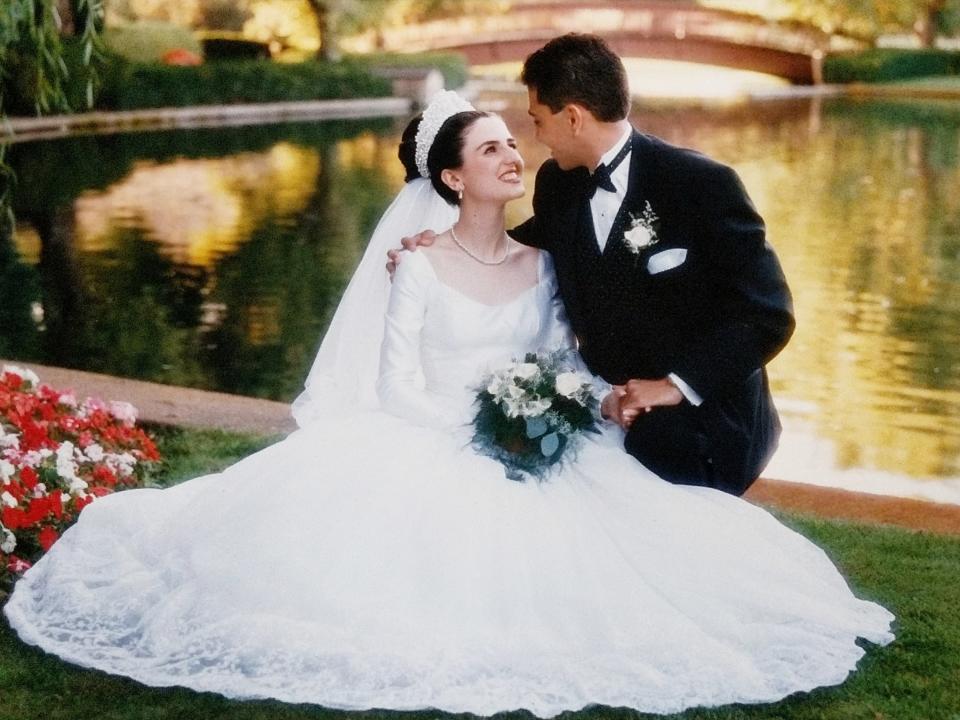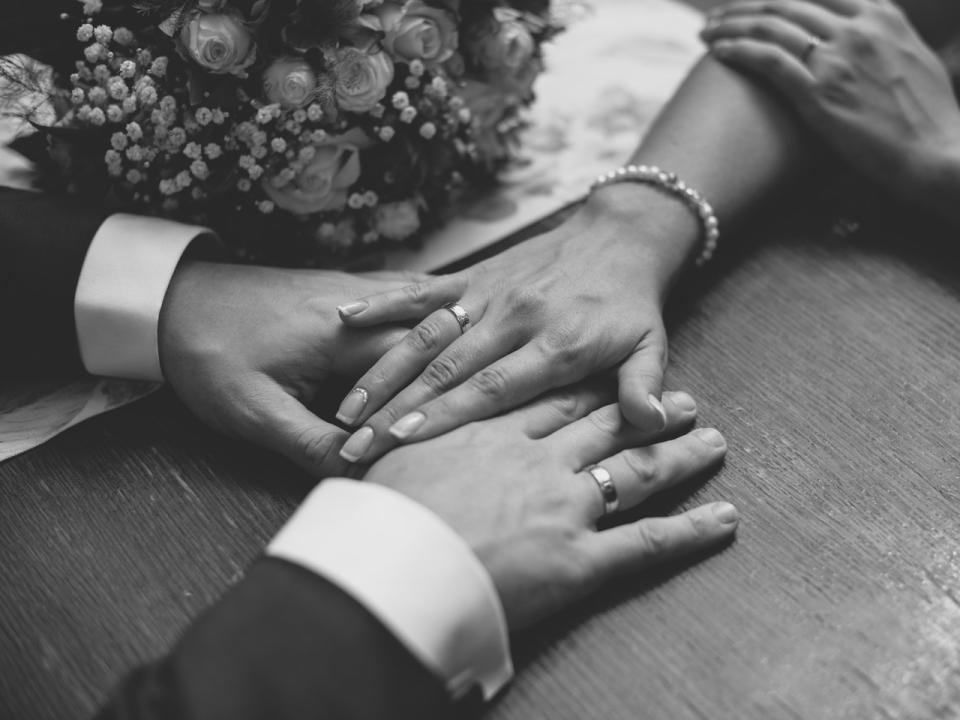7 Things I Wish More People Understood About My Arranged Marriage
As a first generation Iraqi-American born and raised in the U.S., I have been asked if my marriage was arranged more times than I can count. In my early 20s, it was the first thing out of people’s mouths when they found out I was Muslim and newly married. I heard it from coworkers, hairdressers, and acquaintances, and it always gave me pause. I didn’t want to be associated with the stereotypes arranged marriages conjure up—the prodding parents, the exchange of dowries, the unwilling bride, and the pitiable loveless life.
My story was nothing like that. Even though I never dated my husband before we got engaged, we met when we were children. We’d grown up together, and my husband told me he had feelings for me before his family officially proposed. But that backstory was too much to share in casual conversation, and I always walked away from these exchanges feeling as if my very existence had fulfilled the stereotypes of the person in front of me.
I’ve now been happily married for over 20 years, but the myths surrounding arranged marriages persist. I don’t want another generation of people, choosing to uphold their families’ or their cultures’ traditions, to feel as if their relationships are in any way inferior to couples who have had more typical love stories.
Here are seven things I wish more people understood about match-made marriages like mine.
1. An arranged marriage is not the same thing as a forced marriage.
My father actually thought I was too young to get married. Over the course of my engagement, he repeatedly asked me if I wanted to call things off, but he never pushed me to change my mind either. He knew that who I married was ultimately my decision. The most pervasive and damaging misconception about arranged marriage is that the couple, and more commonly, the woman, is coerced. While I would never deny the occurrence of forced marriages in different communities across the world, this practice is very different from arranged marriage. The far more common scenario is for a couple to be introduced through family or friends—or a growing number of Muslim dating apps and online matchmaking services—and then for both parties to agree to a courtship.
2. Listening to your parents’ advice about who to pick as a partner is not necessarily a bad thing.
Television and movies repeatedly offer the message that having your parents involved in the choice of your partner is preposterous and backwards. During the rare circumstances when we do see a character from an immigrant background from a culture where matchmaking is the norm, it is almost always in the context of standing up to their parents to marry the person they love.
Truthfully, the most difficult thing about my mother’s role in choosing in my partner was explaining it to my American friends.
During my engagement, I complained to my mother that my fiancé wasn’t as goal-oriented and driven as I was. My mom told me that I should be grateful. There wasn’t room for two big egos in one household. Over the years, I have come to see the wisdom of her words. One of the things I appreciate most about my spouse is that he is not motivated by a never-ending to-do list. I turn to my husband when I need a dose of perspective and someone to calm me down.
3. There’s an upside to knowing a prospective partners’ intentions are for marriage from the outset.
When I was a teenager, I longed for the element of surprise in romantic relationships, much like what I saw in romantic comedies. But I’ve since come to see the benefit of knowing a partner’s intentions from the outset.
My husband and I may have been young when we got engaged, but we also skipped the surface level, getting-to-know-you stage, where everyone is worried about showing that they care too early in the relationship. Clear intentions are a fast track to intimate and deep conversation, and right away, we were able to talk openly about the issues that really matter in a relationship—compatibility, values, and goals.

4. Sharing the same background, traditions, and values as your partner means one less thing to navigate as couple.
My husband and I never had to discuss whether or not we’d pick Arabic names for our children, teach our children to say their daily prayers, or spend our religious holidays at the masjid. All these were a given in our household.
Not only were we raised with the same religion and traditions, but we both embraced them and wanted to carry them on. As the first generation in my family to be born in the United States, this means a lot to me. I have already lost so many of my family’s culture and traditions, and I appreciate having a spouse that can help me pass down as much of my heritage to my children as possible.
5. You don’t have to have previous relationships to know what you want in a partner.
I had several close non-Muslim girlfriends in college who were under constant pressure from well-meaning family and friends to date other people before settling down with their first serious boyfriend. They were repeatedly asked how they could know if their boyfriend was the one if they hadn’t dated anyone else. I reassured these friends that seeing other people was not a universal prerequisite for marriage, and that there were so many parts of the world where their relationship would have never been questioned.
I do not doubt that the life experience gained from past relationships can teach us something about ourselves, but that does not mean that there is less opportunity for self-discovery and growth from within a committed relationship. Being with one partner your entire life is not a deterrent to self-knowledge. It’s just a different path.
6. It shouldn’t be taboo to get married for pragmatic reasons.
When I married my husband, there were several things I was certain of—his character, how much I trusted him, how safe I felt with him, how much he respected me. But I didn’t know if I was “in love” because the language for love in American culture was all about butterflies, sparks, and chemistry.
Now I question why we are encouraged to research and get input on every decision—from the cars we buy, the colleges we choose, to where we live—but who we spend our lives with and have children with is, at least at first, based on such ambiguous feelings. While I have no doubt that those feelings can point us in the direction of wonderful people, I don’t think it’s the only way to find them.
7. There is not one kind of love story.
For years, I wondered if I’d been “in love” with my spouse because my relationship was so different from any of the love stories I’d encountered in books and movies. I never stopped to question why these stories were so incredibly narrow. I’d known my husband since childhood, and the kind of attraction that is based on novelty and “the chase” was not going to happen for me. But, I now see what a unique privilege it is to have shared so much of my life with my spouse. And even though it’s not your typical love story, I’m so glad it’s mine.
Related: What 12 Women Wish They'd Known Before Getting Married
Huda Al-Marashi is the author of the memoir First Comes Marriage: My Not-So-Typical American Love Story (November 13, 2018).


